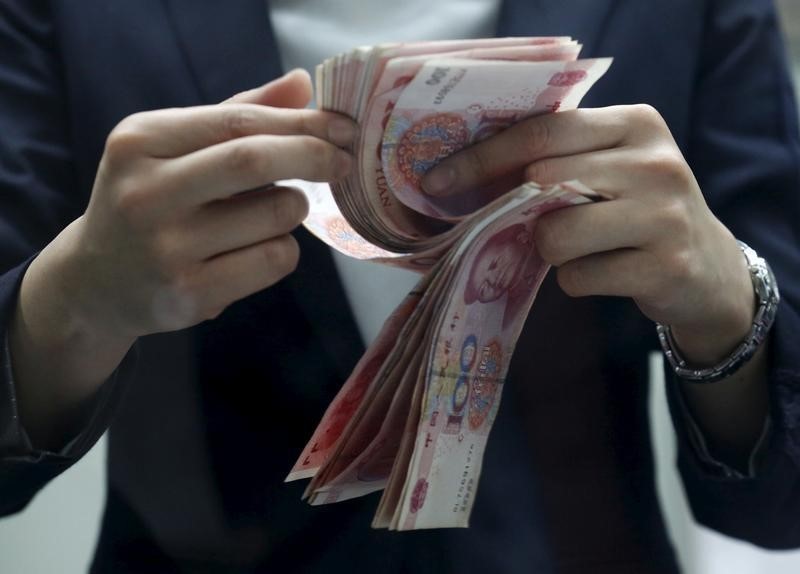BEIJING (Reuters) - China unveiled guidelines on Monday to reduce rising corporate debt levels which some analysts fear could destabilize the world's second-largest economy.
The government will take a multi-pronged approach to cutting company debt, including encouraging mergers and acquisitions, bankruptcies, debt-to-equity swaps and debt securitization, according to guidelines issued by State Council, or the cabinet.
Corporate China sits on $18 trillion in debt, equivalent to about 169 percent of gross domestic product (GDP).
International institutions have warned Beijing to stop financing weak firms, especially inefficient state-owned enterprises, which tend to crowd out the private sector.
They also say the government needs to allow more defaults to improve credit allocation and stop wasteful spending in the economy.
High debt levels have added to operating difficulties for some Chinese firms, increasing their debt risks and financial risks, the National Development and Reform Commission (NDRC) said in a document released during a news briefing in Beijing.
"Market-oriented debt-to-equity swaps will be one of the important measures to reduce corporate leverage," NDRC's vice chairman Lian Weiliang said during the briefing.
But Lian warned the swaps are not a "free lunch" for troubled companies, adding that loss-making "zombie" firms are strictly forbidden from such exchanges, which will be used mainly to help high-quality firms that face temporary difficulties.
The government also will not be responsible for losses occurred during the swap process in a bid to prevent "moral hazard", he added.
The government aims to stabilize and reduce corporate debt levels in the near- and medium-term, the state planner said.
China's bond markets have worked for years on the assumption that issuers were effectively guaranteed by the state.
Since 2014, though, Beijing has been cautiously trying to change that perception by allowing some issuers to default.
China will combine deleveraging with overcapacity reductions, and the government will also provide preferential tax treatment to help firms cut debt levels, officials said.
The central bank will create a favorable monetary policy environment for debt reduction, Fan Yifei, a vice governor of the People's Bank of China, told the briefing.
Banks will be encouraged to transfer bad loans to asset management companies and push forward the securitization of bad assets, according to the cabinet guidelines.
However, banks cannot be forced to conduct the swaps, Lian said.
His comments were echoed by Dai Bohua, assistant minister at the Ministry of Finance, who said the government will prevent a shift of risks from non-financial firms to banks under the debt-to-equity swaps.
Debt has emerged as one of China's biggest challenges, with the country's total debt load rising to 250 percent of GDP.
Excessive credit growth in China is signalling an increasing risk of a banking crisis in the next three years, the Bank of International Settlements (BIS) warned recently.
According to a recent Reuters analysis, profits at roughly a quarter of Chinese companies were too low in the first half of this year to cover their debt servicing obligations, as earnings languish and loan burdens increase.
China experimented with debt-to-equity swaps in the late 1990s as part of sweeping reforms to the state sector that led to around 28 million layoffs over five years. But experts said the program made state-owned firms less willing to find ways to pay back debts.
